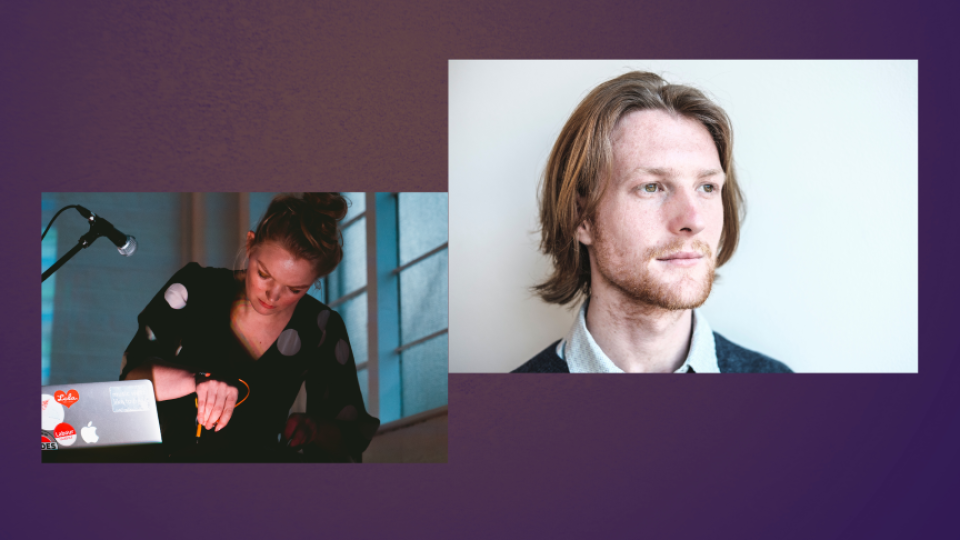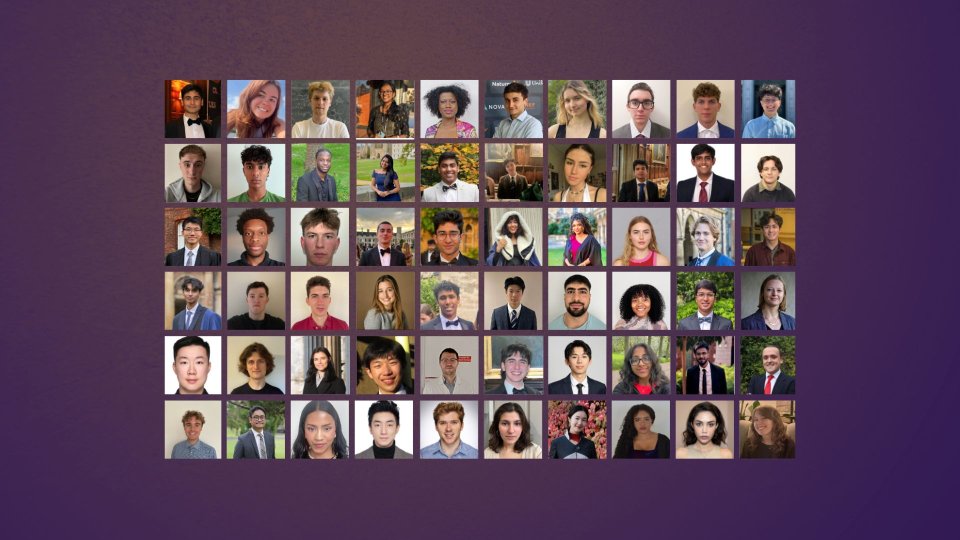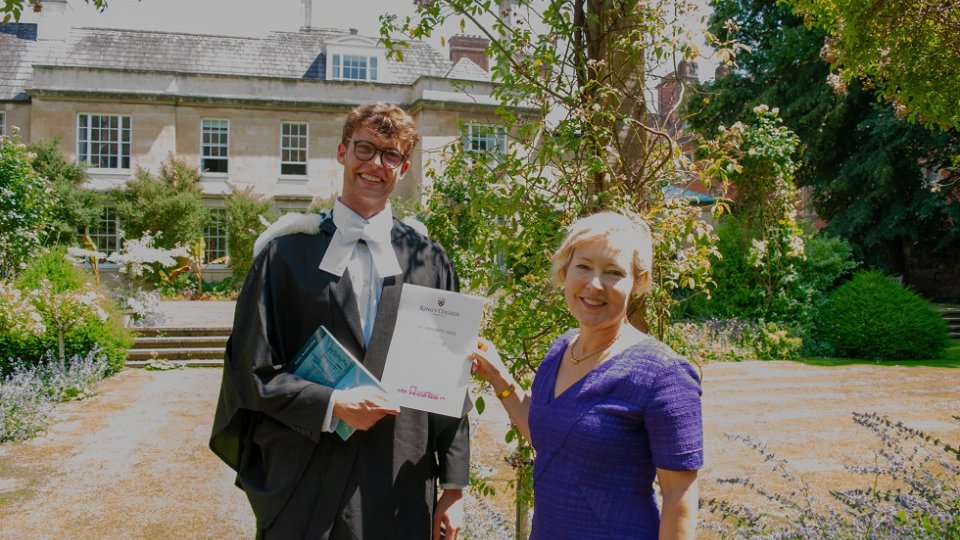
Mie is from Madrid in Spain, where she took both the International Baccalaureate with Biology, German and Spanish Literature at Higher Level, and the Spanish Titulo de Bachiller (NB. it is not normally necessary to take both qualifications as long as you meet the subject requirements). Mie has just finished her second year studying Natural Sciences (Biological) here at King's College, Cambridge.
Why did you want to do a degree in Natural Sciences at Cambridge?
It was the option of the modules that really drew me in. I was always kind of sure about studying biology, but I never really knew which topics I enjoyed the most, so I thought that this degree would give me the chance to explore my options and make a more informed decision. Also, the idea of having mathematics in my first year appealed to me, as it's a subject I really enjoy studying and I consider maths to be very important.
Cambridge has such a great system, not only the amazing facilities and inspiring places, but the chance to have a more “personalized” education through supervisions and having a director of studies really does make the difference. It allows you to delve into topics that you find interesting, as they can recommend references and literature.
Although I was quite terrified at first about the idea of having to prove my knowledge in an essay format, this gives you the chance to play to your strengths, as you can interpret the essay title and construct your arguments. The point I am trying to get across is that Natural Sciences as a course moves away from the sixth form style of memorization in biology, to focus instead on really understanding the concepts that are being dealt with. Of course this is a lot harder, but at the same time, it's much more worth of your time!
Did you do anything in particular to prepare for your application?
Coming from Spain, I had no proper lab research experience, but I still had to prove my enthusiasm for science (personally this is what I think they are really after, that you show commitment/dedication/passion for your subject), so I did the next closest thing I could do: I attended scientific talks, events, open days and wrote articles on the content discussed. I also completed several online courses. This way, when I went to the interview and they asked me about projects I had carried out, I was able to talk about all these cool things I had been hearing and learning about. Basically, my advice is to just be pro-active and try to show that you are excited about a life in science.
Something I think everyone does when preparing for their application, is to start thinking seriously about the skill-set they have acquired. Many different skills can be transferable to the degree you want to pursue. In the case of Natural Sciences, I found the course demanded a lot of independent work. I felt prepared to face this due to all the coursework present in the International Baccalaureate system.
I found the application process to be a stressful time as everyone does - there is always the looming question of “am I doing this right?”. However, the key is that there is no “right” way. Just be confident in everything you have achieved so far, and put it down on paper so that they know. Of course, blogs and other peoples' experiences are worth checking out, but you needn't be overly influenced by them.
How did you find the interviews?
The interviews were what really made me want to come to Cambridge. I enjoyed them SO much. It wasn’t about testing my sixth-form knowledge at all - they wanted to see how I thought, how I reacted to a difficult problem. It was more a discussion then an interview: they would ask a stimulating question, and I would begin to answer. If I got stuck somewhere, I could ask them for their thoughts. One question I got at an interview was what I thought the potential relationship between Alzheimer’s and another medical condition could be. Of course, I didn’t have the slightest clue, but I gave it my best/most original intent. I know that people say this 10,000 times over, but don’t suffer through the interviews - try and enjoy the experience, you can’t prepare too much for them. Personally, I feel that if you enjoy it, then you will enjoy how Cambridge works academically.
What attracted you to King's?
Coming from Spain, I had little understanding of the collegiate system at Cambridge. I ordered the prospectus and read through the colleges section, and I think I noticed that King’s was the only one that stated “we welcome international students” so I checked it out more. The site seemed beautiful and there was a whole section on the webpage on green initiatives and activities, which I found pretty cool. It wasn’t a proper informed decision, more just like a gut feeling.
However, it definitely was a great choice! People are loving, creating a really cosy environment and community of people (although I am sure that can be said of every single college). King’s is really down-to-earth and friendly. Formals take place less often than at some other colleges, so people really make the effort to go to them when they are on and the end-of-year ball (the King's Affair) is more affordable and more about the music than the attractions, and it's fancy dress! King’s is famous for being more relaxed about these “Cambridge traditions”, e.g. we don’t wear gowns, and our student body is politically active. All in all, the people and fellows (academics) here are great, and I would definitely recommend it.
What was the transition like from studying sciences in the IB to studying these subjects at Cambridge?
Studying science at university level is quite different to the standards of the IB in the sense that they are training you to become a potential researcher: to analyse data, to think critically, experimental design… Sadly, you can’t escape the need to memorize many, many facts, but I still find that the thought process is different. This is where supervisors come in: they organize weekly tutorial sessions in which you can ask the questions you may have and discuss the things you learnt that week. In this manner, they aid the transition from a more “text-book”-type learning approach to a more mature and independent style. So if you find something particularly interesting in your lectures, you are encouraged to dig deeper into it and try to include it as further reading into your essays.
I think that the most challenging thing I have encountered is the lack of limits - there is no Vade Mecum (the IB syllabus) as there is in the IB. Instead, you learn and read as much as you possibly can to have the knowledge to tackle the essay titles in the exam. Perhaps one of the biggest challenges I have encountered is finding a balance of how much to read around a topic. Supervisors do help you in this, though, especially when directing you in what to read.
Did you find it easy to settle in as an international student?
Settling in was very smooth as everyone is in the same boat and there are many older years and members of the committee here to help make King's your “home” as fast as possible. Of course, changing countries has its difficult moments and you will experience a clash in cultures for sure, but there are many people here to help you out whenever for whatever. It really has been a fun experience!
Where do you normally study?
Before coming to Cambridge I always studied in my room, but now I need to go to a library to be productive. Not only is the change of environment nice (this town is full of accessible libraries to have a change of scene), but also King’s library is beautiful. I find it a lot easier to study in a place like this, and it's inspiring to be surrounded by books and other people who are also struggling to meet deadlines!
How do you prepare for supervisions?
Supervisions vary so much between subjects and between supervisors. Generally, they will ask more broad questions to see if you have understood the content well, and if so, they can move on to talk about something related or a bit more challenging. The only preparation is to go through your lecture and lab notes and try to grasp all the information.
Which courses have you taken so far? Have you specialised as you've gone through the course?
Even when I'd completed first year, I wasn’t completely sure which field of biology was the one I wanted to go into. Therefore, I kept my second year options broad by studying cellular biology and biochemistry. My three modules in second year were: biochemistry and molecular biology; cell and developmental biology; and plants and microbial sciences.
My initial “plan” when signing up to Natural Sciences was to follow more human-related modules, such as pathology or pharmacology, but I developed a really strong interest in plants, partly because of their relevance in the global issues of today (food security, sustainability, climate change…), but also because I had a great and passionate supervisor and the department is really welcoming and lovely. What is so great about the Natural Sciences course, is that you have the chance to try out modules you didn’t even suspect you would be interested in doing. Now, I am going into third year and fully specializing in plant sciences which is also the area on which I am completing my summer internship this year.
That's one of the great advantages here - the ease of getting summer placements at amazing labs. Many researchers are the lecturers themselves, and they are very keen on taking on students. Cambridge is also very different in the summer, outside term-time!
What does your typical weekly timetable look like?
The timetable of a second year Natural Scientist (or 'NatSci', as we call ourselves here) is quite busy, but still a lot better than first year! It really depends on which combination of modules you take, but generally for biologists you will have nine hours of lectures spread from Monday to Saturday, and a weekly lab session for each module as well as a supervision. It’s true that days become quite long, but having so many contact hours really makes you become organized and time-efficient, and at least you go from lectures to labs instead of spending all day in the library.
What have you found hardest about the Natural Sciences course?
The hardest thing about the course is just that: it's hard. What I mean is that there are no absolute right answers anymore, no full marks. You get an essay title or a problem, and you need to read up on it and think. I found this stressful at first - it's slow progress to really think about something rather than having an easily accessible answer. This is something that does get better (fast), as you learn to deal with it and to keep on learning from all the corrections you get on the way.
The academic support given at King’s is really good because the supervisors are not too intense. I know of other colleges where you are ‘expected’ to do well and I would not like having that sort of pressure on me. Of course, each supervisor is different and the preference for teaching style really is a personal matter. Overall, all the academic support I have received has been really good.
What's been the most interesting topic you've covered?
The most interesting thing that I have studied so far relates to the potential that plants have. There is on-going research here at Cambridge to change the physiology of a plant (from C3 to C4 for those who know) to make them much more efficient with globally increasing temperatures. This is such a pressing issue, as it is estimated that by the year 2050 we need to double our food production due to the growing population, but without expanding the area used, so the challenge needs to be approached from a sustainable standpoint. It’s really great that I have been able to apply to work in the lab that is carrying out this research for my second year project!
How do you find the work/social life balance?
Personally, I've found achieving this work/social life balance the biggest challenge so far. There are so many exciting things going on at Cambridge, and so many inspirational people to meet, that it is really easy to get carried away, but then you realise that you have three years (maybe even four depending on your course) to try out stuff. No matter where your interests lie, you will find someone to do it with, guaranteed.
I am a member of the University Basketball Team so that takes up a lot of my “free” time for training, organizing the college league, and being a member of the committee… All matches are on Wednesday afternoons, and we have to travel to other universities so that eats the whole day away, but it’s nice to escape the Cambridge bubble every now and again, and also to have a different group of friends from other courses, years and colleges. One of the coolest things I have done is to get involved in the committee. It’s all student-run, which means more work, but also that we get to make all the decisions.
This year I am also the Female Welfare Officer for the King’s College Student Union (KCSU). Basically I am in charge of organizing events to help make the college community more closely-knit and warm, as well as being a person to chat to if anyone has any issues or problems. I work in close collaboration with the Male Welfare Officer as well as the college Welfare Tutor, but both within King's and within the university there is such a strong support network for all students.
What is the accommodation like in King's?
This year I lived in Webb’s Court in Q staircase with all my friends, and it has been so much fun. In first year, I lived in Keynes. The accommodation is great, right in the city centre so very convenient for when you have long lab days. My only piece of advice for new-comers would be to find accommodation with a shared kitchen in first year. Mine didn’t have one and I feel I missed out on the social side of cooking with your corridor neighbours. Otherwise, all King’s accommodation is truly good and well-priced. Also, King’s has a band system, in which you choose rooms within a band so you can decide how much you want to spend on accommodation. I don’t think all colleges have this.
How do you feel about the collegiate system?
Second year 'halfway hall' dinner with all Natscis (both physical and biological). King’s arranges a formal dinner to celebrate that half our degree is done and the Directors of Studies come along, and it's really fun!
I would go so far as to say that the best thing about the collegiate system is having friends from different subjects. They make conversations so much more interesting, and after a day reading about biology, you really want to talk about something else over dinner. I also love it when I am studying in the library surrounded by people studying things completely different to what I am doing. I just find it all the more interesting.
I do find time to be with people from other colleges as well, and I would definitely recommend it. The easiest way is probably to join a university-wide society. Although King’s is not a small college, sometimes I need a change of scenery!
Do you know what you plan to do after your degree?
I don’t know for certain, I don’t think anyone does, and I am waiting to see what opportunities come up, but I am definitely very interested in research and thus pursuing a Ph.D. in plant sciences.
August 2016


